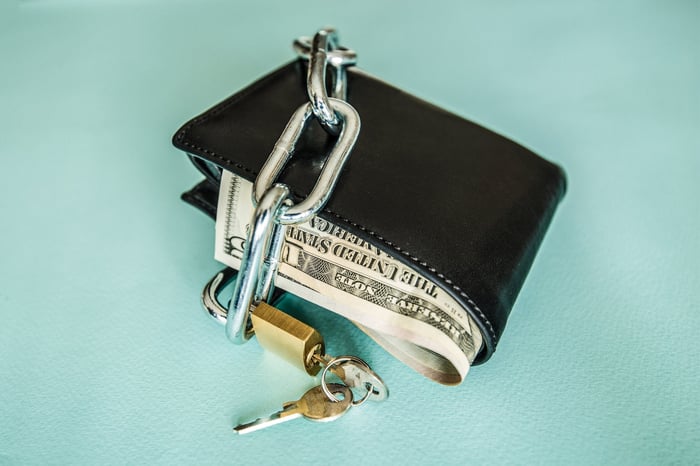
Image source: Getty Images.
While it doesn't influence our opinions of products, we may receive compensation from partners whose offers appear here. We're on your side, always. See our full advertiser disclosure here.
Most of us spend money on things that aren't essentials -- streaming services, loungewear, food delivery, and so forth. These things may not be absolute necessities, but sometimes they're important to our mental and, in some cases, physical well-being.
But let's face it -- non-essential spending can be a huge budget-buster. And it can also be the very thing that keeps you from meeting your financial goals, whether those include padding your savings account, socking away a down payment to buy a home, or funding a retirement plan. That's why it's a good idea to pledge to spend more mindfully in the coming year.
Keep in mind that spending mindfully is not the same thing as spending less. Rather, it means getting value from your spending, and feeling good about the things you end up buying instead regretting them later. Here are three ways to make that happen.
1. Do an in-depth value assessment before you buy
You'll often hear that you're supposed to ask yourself, "Do I really need this?" each time you make a purchase. But as we just discussed, sometimes we buy things that aren't exactly necessities to maintain a reasonable quality of life. There's nothing wrong with that. But what you should ask yourself before buying is what value each purchase will bring.
A $15 monthly streaming service could buy you hours of TV entertainment, so you may decide that's a worthwhile investment. A single $20 takeout meal, on the other hand, might feed you for a night, but then you're out the cash. Think about what you gain from each purchase before moving forward, so you feel like you're putting your money to good use.
2. Comparison shop rather than assume you're getting a deal
How often are you tempted to buy something fun because it's on sale? There's nothing wrong with treating yourself on occasion, but don't let the presence of the word "sale" trick you into believing you're getting a great deal. It's easy for a retailer to take one dollar off an item's original price and call it a sale.
Always comparison shop when you're looking at items of financial significance. You don't need to shop around for the best deal on a $6 fast food purchase (though stocking up on coupons always helps), but if you're buying a $200 gadget, that's worth researching.
Of course, another solution is to get a credit card that offers price protection. That way, if you buy something and its price drops shortly thereafter, you're eligible to receive the difference.
3. Think about the number of working hours it takes to buy something
We all hustle to score our spending money, and when you think about the effort it can take to buy various things, it may help you make wiser choices. Say you earn $30 an hour at your job and you're tempted to buy a $60 video game. Ask yourself whether that game is worth two hours of plugging away at what you do for a living. You may find that the enjoyment you'd get from a particular purchase isn't worth the time you'd spend working for the cash.
No matter what financial goals you set for yourself in 2021, mindful spending could be your ticket to achieving them. Keep these tips in mind as you gear up to ring in the new year, and you'll come out a rock-star saver on the other side.




